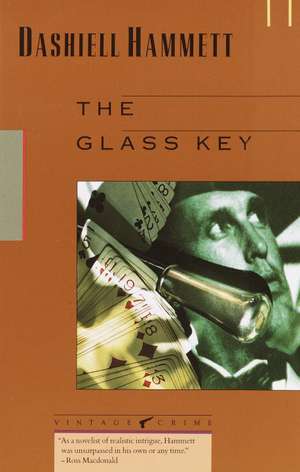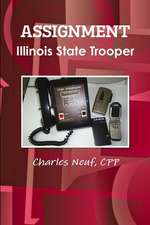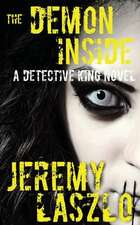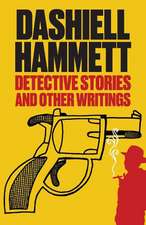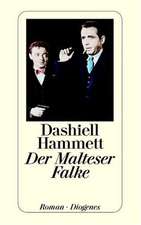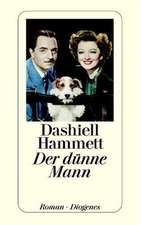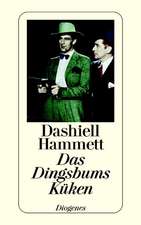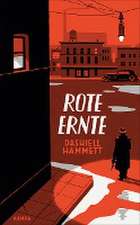The Glass Key
Autor Dashiell Hammett Editat de Jeff Stoneen Limba Engleză Paperback – 30 iun 1989
A one-time detective and a master of deft understatement, Dashiell Hammett virtually invented the hard-boiled crime novel. This classic Hammet work of detective fiction combines an airtight plot, authentically venal characters, and writing of telegraphic crispness.
| Toate formatele și edițiile | Preț | Express |
|---|---|---|
| Paperback (2) | 48.23 lei 3-5 săpt. | +23.90 lei 7-13 zile |
| Orion Publishing Group – 2 feb 2012 | 48.23 lei 3-5 săpt. | +23.90 lei 7-13 zile |
| Vintage Crime/Black Lizard – 30 iun 1989 | 86.61 lei 3-5 săpt. |
Preț: 86.61 lei
Nou
Puncte Express: 130
Preț estimativ în valută:
16.57€ • 18.06$ • 13.97£
16.57€ • 18.06$ • 13.97£
Carte disponibilă
Livrare economică 02-16 aprilie
Preluare comenzi: 021 569.72.76
Specificații
ISBN-13: 9780679722625
ISBN-10: 0679722629
Pagini: 224
Dimensiuni: 134 x 205 x 14 mm
Greutate: 0.24 kg
Ediția:New ed.
Editura: Vintage Crime/Black Lizard
ISBN-10: 0679722629
Pagini: 224
Dimensiuni: 134 x 205 x 14 mm
Greutate: 0.24 kg
Ediția:New ed.
Editura: Vintage Crime/Black Lizard
Notă biografică
Dashiell Samuel Hammett was born in St. Mary’s County. He grew up in Philadelphia and Baltimore. Hammett left school at the age of fourteen and held several kinds of jobs thereafter—messenger boy, newsboy, clerk, operator, and stevedore, finally becoming an operative for Pinkerton’s Detective Agency. Sleuthing suited young Hammett, but World War I intervened, interrupting his work and injuring his health. When Sergeant Hammett was discharged from the last of several hospitals, he resumed detective work. He soon turned to writing, and in the late 1920s Hammett became the unquestioned master of detective-story fiction in America. In The Maltese Falcon (1930) he first introduced his famous private eye, Sam Spade. The Thin Man (1932) offered another immortal sleuth, Nick Charles. Red Harvest (1929), The Dain Curse (1929), and The Glass Key (1931) are among his most successful novels. During World War II, Hammett again served as sergeant in the Army, this time for more than two years, most of which he spent in the Aleutians. Hammett’s later life was marked in part by ill health, alcoholism, a period of imprisonment related to his alleged membership in the Communist Party, and by his long-time companion, the author Lillian Hellman, with whom he had a very volatile relationship. His attempt at autobiographical fiction survives in the story “Tulip,” which is contained in the posthumous collection The Big Knockover (1966, edited by Lillian Hellman). Another volume of his stories, The Continental Op (1974, edited by Stephen Marcus), introduced the final Hammett character: the “Op,” a nameless detective (or “operative”) who displays little of his personality, making him a classic tough guy in the hard-boiled mold—a bit like Hammett himself.
Extras
THE BODY IN CHINA STREET I Green dice rolled across the green table, struck the rim together, and bounced back. One stopped short holding six white spots in two equal rows uppermost. The other tumbled out to the center of the table and came to rest with a single spot on top. Ned Beaumont grunted softly--"Uhn!"--and the winners cleared the table of money. Harry Sloss picked up the dice and rattled them in a pale broad hairy hand. "Shoot two bits." He dropped a twenty-dollar bill and a five-dollar bill on the table. Ned Beaumont stepped back saying: "Get on him, gamblers, I've got to refuel!" He crossed the billiard-room to the door. There he met Walter Ivans coming in. He said, "'Lo, Walt," and would have gone on, but Ivans caught his elbow as he passed and turned to face him. "D-d-did you t-talk to P-p-paul?" When Ivans said "P-p-paul" a fine spray few out between his lips. "I'm going up to see him now." Ivans's china-blue eyes brightened in his round fair face until Ned Beaumont, narrow of eye, added: "Don't expect much. If you could wait awhile." Ivans's chin twitched. "B-b-but she's going to have the b-b-baby next month." A startled look came into Ned Beaumont's dark eyes. He took his arm out of the shorter man's hand and stepped back. Then a corner of his mouth twitched under his dark mustache and he said: "it's a bad time, Walt, and--well--you'll save yourself disappointment by not looking for much before November." His eyes were narrow again and watchful. "B-b-but if you t-tell him--" "I'll put it to him as hot as I can and you ought to know he'll go the limit, but he's in a tough spot right now." He moved his shoulders and his face became gloomy except for the watchful brightness of his eyes. Ivans wet his lips and blinked his eyes many times. He drew in a long breath and patted Ned Beaumont's chest with both hands. "G-g-go up now," he said in an urgent pleading voice. "I-I'll wait here f-for you." II Ned Beaumont went upstairs lighting a thing green-dappled cigar. At the second-floor landing, where the Governor's portrait hung, he turned towards the front of the building and knocked on the broad oaken door that shut off the corridor at that end. When he heard Paul Madvig's "All right" he opened the door and went in. Paul Madvig was alone in the room, standing at the window, with his hands in his trousers-pockets, his back to the door, looking through the screen down into dark China Street. He turned around slowly and said: "Oh, here you are." He was a man of forty-five, tall as Ned Beaumont, but forty pounds heavier without softness. His hair was light, parted in the middle, and brushed flat to his head. His face was handsome in a ruddy stout-featured way. His clothes were saved from flashiness by their quality and by his manner of wearing them. Ned Beaumont shut the door and said: "Lend me some money." From his inner coat-pocket Madvig took a large brown wallet. "What do you want?" "Couple of hundred." Madvig gave him a hundred-dollar bill and five twenties, asking: "Craps?" "Thanks." Ned Beaumont pocketed the money. "Yes." "It's a long time since you've done any winning, isn't it?" Madvig asked as he returned his hands to his trousers-pockets. "Not so long--a month or six weeks." Madvig smiled. "That's a long time to be losing." "Not for me." There was a faint note of irritation in Ned Beaumont's voice. Madvig rattled coins in his pocket. "Much of a game tonight?" He sat on a corner of the table and looked down at his glistening brown shoes. Ned Beaumont looked curiously at the blond man, then shook his had and said: "Peewee." He walked to the window. Above the buildings on the opposite side of the street the sky was black and heavy. He went behind Madvig to the telephone and called a number. "Hello, Bernie. This is Ned. What's the price on Peggy O'Toole? Is that all? . . . Well, give me five hundred of each . . . Sure. . . . I'm betting it's going to rain and if it does she'll beat Incinerator. . . . All right, give me a better price then. . . . Right." He put the receiver on its prong and came around in front of Madvig again. Madvig asked: "Why don't you try laying off awhile when you hit one of these sour streaks?" Ned Beaumont scowled. "That's no good, only spreads it out. I ought to've put that fifteen hundred on the nose instead of spreading it across the board. Might as well take your punishment and get it over with." Madvig chuckled and raised his head to say: "If you can stand the gaff." Ned Beaumont drew down the ends of his mouth, the ends of his mustache following them down. "I can stand anything I've got to stand," he said as he moved towards the door. He had his hand on the door-knob when Madvig said, earnestly: "I guess you can, at that, Ned." Ned Beaumont turned around and asked, "Can what?" fretfully. Madvig transferred his gaze to the window. "Can stand anything," he said. Ned Beaumont studied Madvig's averted face. The blond man stirred uncomfortably and moved coins in his pockets again. Ned Beaumont made his eyes blank and asked in an utterly puzzled tone: "Who?" Madvig's face flushed. He rose from the table and took a step towards Ned Beaumont. "You go to hell," he said. Ned Beaumont laughed. Madvig grinned sheepishly and wiped his face with a green-bordered handkerchief. "Why haven't you been out to the house?" he asked. "Mom was saying last night she hadn't seen you for a month." "Maybe I'll drop in some night this week." "You ought to. You know how Mom likes you. Come for supper." Madvig put his handkerchief away. Ned Beaumont moved towards the door again, slowly, watching the blond man from the ends of his eyes. With his hand on the knob he asked: "Was that what you wanted to see me about?" Madvig frowned. "Yes, that is--" He cleared his throat. "Uh--oh--there's something else." Suddenly his diffidence was gone, leaving him apparently tranquil and self-possessed. "You know more about this stuff than I do. Miss Henry's birthday's Thursday. What do you think I ought to give her?" Ned Beaumont took his hand from the door-knob. His eyes, by the time he was facing Madvig squarely again, had lost their shocked look. He blew cigar-smoke out and asked: "They're having some kind of birthday doings, aren't they?" "Yes." "You invited?" Madvig shook his head. "But I'm going there to dinner tomorrow night." Ned Beaumont looked down at his cigar, then up at Madvig's face again, and asked: "Are you going to back the Senator, Paul?" "I think we will." Ned Beaumont's smile was mild as his voice when he put his next question: "Why?" Madvig smiled. "Because with us behind him he'll snow Roan under and with his help we can put over the whole ticket just like nobody was running against us." Ned Beaumont put his cigar in his mouth. He asked, still mildly: "Without you"--he stressed the pronoun--"behind him could the Senator make the grade this time?" Madvig was calmly positive. "Not a chance." Ned Beaumont, after a little pause, asked: "Does he know that?" "He ought to know it better than anybody else. And if he didn't know it-- What the hell's the matter with you?" Ned Beaumont's laugh was a sneer. "If he didn't know it," he suggested, "you wouldn't be going there to dinner tomorrow night?" Madvig, frowning, asked again: "What the hell's the matter with you?" Ned Beaumont took the cigar from his mouth. His teeth had bitten the end of it into shredded ruin. He said: "There's nothing the matter with me." He put thoughtfulness on his face. "You don't think the rest of the ticket needs his support?" "Support's something no ticket can get too much of," Madvig replied carelessly, "but without his help we could manage to hold up our end all right." "Have you promised him anything yet?" Madvig pursed his lips. "It's pretty well settled." Ned Beaumont lowered his head until he was looking up under his brows at the blond man. His face had become pale. "Throw him down, Paul," he said in a low husky voice. "Sink him." Madvig put his fists on his hips and exclaimed softly and incredulously: "Well, I'll be damned!" Ned Beaumont walked past Madvig and with unsteady thin fingers mashed the burning end of his cigar in the hammered copper basin on the table. Madvig stared at the younger man's back until he straightened and turned. Then the blond man grinned at him with affection and exasperation. "What gets into you, Ned?" he complained. "You go along fine for just so long and then for no reason at all you throw an ing-bing. I'll be a dirty so-and-so if I can make you out!" Ned Beaumont made a grimace of distaste. He said, "All right, forget it," and immediately returned to the attack with a skeptical question: "Co you think he'll play ball with you after he's re-elected?" Madvig was not worried. "I can handle him." "Maybe, but don't forget he's never been licked at anything in his life." Madvig nodded in complete agreement. "Sure, and that's one of the best reasons I know for throwing in with him." "No, it isn't, Paul," Ned Beaumont said earnestly. "it's the very worst. Think that over even if it hurts your head. How far has this dizzy blond daughter of his got her hooks into you?" Madvig said: "I'm going to marry Miss Henry." Ned Beaumont made a whistling mouth, though he did not whistle. He made his eyes smaller and asked: "Is that part of the bargain?" Madvig grinned boyishly. "Nobody knows it yet," he replied, "except you and me." Spots of color appeared in Ned Beaumont's lean cheeks. He smiled his nicest smile and said: "You can trust me not to go around bragging about it and here's a piece of advice. If that's what you want, make them put it in writing and swear to it before a notary and post a cash bond, or, better still, insist on the wedding before election-day. Then you'll at least be sure of your pound of flesh, or she'll weight around a hundred and ten, won't she?" Madvig shifted his feet. He avoided Ned Beaumont's gaze while saying: "I don't know why you keep talking about the Senator like he was a yegg. He's a gentleman and—" "Absolutely. Read about it in the Post—one of the few aristocrats left in American politics. And his daughter's an aristocrat. That's why I'm warning you to sew your shirt on when you go to see them, or you'll come away without it, because to them you're a lower form of animal life and none of the rules apply." Madvig sighed and began: "Aw, Ned, don't be so damned—" But Ned Beaumont had remembered something. His eyes were shiny with malice. He said: "And we oughtn't to forget that young Taylor Henry's an aristocrat too, which is probably why you made Opal stop playing around with him. How's that going to work out when you marry his sister and he's your daughter's uncle-in-law or something? Will that entitle him to begin playing around with her again?" Madvig yawned. "You didn't understand me right, Ned," he said. "I didn't ask for all this. I just asked you what kind of present I ought to give Miss Henry." Ned Beaumont's face lost its animation, became a slightly sullen mask. "How far have you got with her?" he asked in a voice that expressed nothing of what he might have been thinking. "Nowhere. I've been there maybe half a dozen times to talk to the Senator. Sometimes I see her and sometimes I don't, but only to say 'How do you do' or something with other people around. You know, I haven't had a chance to say anything to her yet." Amusement glinted for a moment in Ned Beaumont's eyes and vanished. He brushed back one side of his mustache with a thumb-nail and asked: "Tomorrow's your first dinner there?" "Yes, though I don't expect it to be the last." "And you didn't get a bid to the birthday party?" "No." Madvig hesitated. "Not yet." "Then the answer's one you won't like." Madvig's face was impassive. "Such as?" he asked. "Don't give her anything." "Oh, hell, Ned!" Ned Beaumont shrugged. "Do whatever you like. You asked me." "But why?" "You're not supposed to give people things unless you're sure they'd like to get them from you." "But everybody likes to—" "Maybe, but it goes deeper than that. When you give somebody something, you're saying out loud that you know they'd like to have you give—" "I got you," Madvig said. He rubbed his chin with fingers of his right hand. He frowned and said: "I guess you're right." His face cleared. He said: "But I'll be damned if I'll pass up the chance." Ned Beaumont said quickly: "Well, flowers then, or something like that, might be all right." "Flowers? Jesus! I wanted—" "Sure, you wanted to give her a roadster or a couple of yards of pearls. You'll get your chance at that later. Start little and grow." Madvig made a wry face. "I guess you're right, Ned. You know more about this kind of stuff than I do. Flowers it is." "And not too many of them." Then, in the same breath: "Walt Ivan's telling the world you ought to spring his brother." Madvig pulled the bottom of his vest down. "The world can tell him Tim's going to stay indoors till after election." "You're going to let him stand trial?" "I am," Madvig replied, and added with more heat: "You know damned well I can't help it, Ned. With everybody up for re-election and the women's clubs on the warpath it would be jumping in the lake to have Tim's case squared now." Ned Beaumont grinned crookedly at the blond man and made his voice drawl. "We didn't have to do much worrying about women's clubs before we joined the aristocracy." "We do now." Madvig's eyes opaque. "Tim's wife's going to have a baby next month," Ned Beaumont said. Madvig blew breath out in an impatient gust. "Anything to make it tougher," he complained. "Why don't they think of those things before they get in trouble? They've got no brains, none of them." "They've got votes." "That's the hell of it," Madvig growled. He glowered at the floor for a moment, then raised his head. "We'll take care of him as soon as the votes are counted, but nothing doing till then."
Recenzii
"Hammett's prose was clean and entirely unique. His characters were as sharply and economically defined as any in American fiction. His gift of invention never tempted him beyond the limits of credibility."
-- The New York Times
-- The New York Times
Descriere
Of Hammett's sixth book, published in 1931, The New York Times wrote "the developing relationships among the characters are as exciting as the unfolding story".
